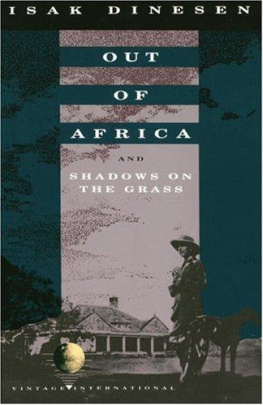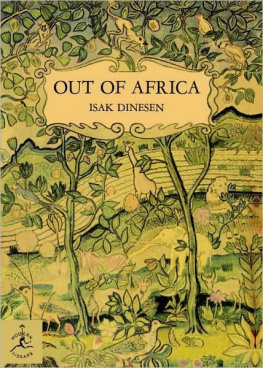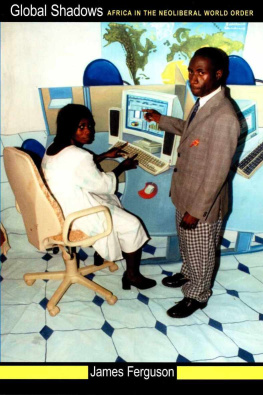Isak Dinesen - Out of Africa and Shadows on the Grass
Here you can read online Isak Dinesen - Out of Africa and Shadows on the Grass full text of the book (entire story) in english for free. Download pdf and epub, get meaning, cover and reviews about this ebook. genre: Detective and thriller. Description of the work, (preface) as well as reviews are available. Best literature library LitArk.com created for fans of good reading and offers a wide selection of genres:
Romance novel
Science fiction
Adventure
Detective
Science
History
Home and family
Prose
Art
Politics
Computer
Non-fiction
Religion
Business
Children
Humor
Choose a favorite category and find really read worthwhile books. Enjoy immersion in the world of imagination, feel the emotions of the characters or learn something new for yourself, make an fascinating discovery.
- Book:Out of Africa and Shadows on the Grass
- Author:
- Genre:
- Rating:5 / 5
- Favourites:Add to favourites
- Your mark:
- 100
- 1
- 2
- 3
- 4
- 5
Out of Africa and Shadows on the Grass: summary, description and annotation
We offer to read an annotation, description, summary or preface (depends on what the author of the book "Out of Africa and Shadows on the Grass" wrote himself). If you haven't found the necessary information about the book — write in the comments, we will try to find it.
Out of Africa and Shadows on the Grass — read online for free the complete book (whole text) full work
Below is the text of the book, divided by pages. System saving the place of the last page read, allows you to conveniently read the book "Out of Africa and Shadows on the Grass" online for free, without having to search again every time where you left off. Put a bookmark, and you can go to the page where you finished reading at any time.
Font size:
Interval:
Bookmark:
BOOK FIVE
FAREWELL TO THE FARM
Gods and men, we are all deluded thus!
Chapter 1
HARD TIMES
My farm was a little too high up for growing coffee. It happened in the cold months that we would get frost on the lower land and in the morning the shoots of the coffee-trees, and the young coffee-berries on them, would be all brown and withered. The wind blew in from the plains, and even in good years we never got the same yield of coffee to the acre as the people in the lower districts of Thika and Kiambu, on four thousand feet.
We were short of rain, as well, in the Ngong country, and three times we had a year of real drought, which brought us very low down. In a year in which we had fifty inches of rain, we picked eighty tons of coffee, and in a year of fifty-five inches, nearly ninety tons; but there were two bad years in which we had only twenty-five and twenty inches of rain, and picked only sixteen and fifteen tons of coffee, and those years were disastrous to the farm.
At the same time coffee-prices fell: where we had got a hundred pounds a ton we now got sixty or seventy. Times grew hard on the farm. We could not pay our debts, and we had no money for the running of the plantation. My people at home, who had shares in the farm, wrote out to me and told me that I would have to sell.
I thought out many devices for the salvation of the farm. One year I tried to grow flax on our spare land. Flax-growing is a lovely job, but it needs much skill and experience. I had a Belgian refugee to give me advice on it, and when he asked me how much land I meant to plant, and I told him three hundred acres, he immediately exclaimed: "a, madame, c'est impossible." I might grow five acres or even ten with success, he said, but no more. But ten acres would take us nowhere, and I put in a hundred and fifty acres. A sky-blue flowering flax-field is a marvellously pretty sight, like a piece of Heaven on earth and there can be no more gratifying kind of goods to be turning out than the flax fibre, tough and glossy, and slightly greasy to the touch. You follow it in your thoughts as it is sent away, and imagine it made into sheets and nightgowns. But the Kikuyu could not, in the turn of a hand and without constant supervision, be taught to be accurate enough in the pulling and retting and scutching of it; and so my flax-growing was no success.
Most of the farmers in the country were, in those years, trying their hand at some such scheme, and to a few of them in the end an inspiration came. Things turned out well for Ingrid Lindstrom of Njoro: at the time when I had left the country, and after she had slaved for twelve years at her market-gardening, pigs, turkeys, castor-oil bushes, and soya-beans, had seen them all fail, and wept over them, she saved her farm for her family and herself by planting pyrethrum, which is sent to France and is there used in making perfumes. But I myself had no luck with my experiments, and when the dry weather and the wind from the Athi plains set in, the coffee-trees drooped and the leaves turned yellow; on parts of the farm we got bad coffee-diseases like thrips and antestia.
To bring the coffee on we tried to manure the fields. It had always, as I had been brought up with European ideas on farming, gone against me to take the crops out of the land, without manuring. When the squatters of the farm heard of the project they came forward to help me, and brought out, from their cattle and goat bomas, the manure of decades. It was delicate peaty stuff that was easy to handle. We ploughed up a furrow between the rows of coffee-trees, with the small new ploughs with a single ox to them that we had bought in Nairobi, and, since we could not get a cart into the fields, the women of the farm carried the manure in sacks on their backs, and spread it in the furrow, a sack to the tree, so that we could lead back the oxen and ploughs, and cover it up. It was pleasant work to watch, and I expected great things from it, but as it came to happen, no one ever saw the effects of the manuring.
One real trouble was that we were short of capital, for it had all been spent in the old days before I took over the running of the farm. We could not carry through any radical improvements, but had to live from hand to mouth, and this, in the last years, became our normal mode of living on the farm.
If I had had the capital, I thought, I would have given up coffee, have cut down the coffee-trees, and have planted forest-trees on my land. Trees grow up so quickly in Africa, in ten years' time you walk comfortably under tall blue gum trees, and wattle trees, which you have yourself, in the rain, carried in boxes from the nurseries, twelve trees in a box. I would have had then, I reflected, a good market for both timber and firewood in Nairobi. It is a noble occupation to plant trees, you think of it many years after with content. There had been big stretches of Native forest on the farm in the old days, but it had been sold to the Indians for cutting down, before I took over the farm; it was a sad thing. I myself in the hard years had had to cut down the wood on my land round the factory for the steam-engine, and this forest, with the tall stems and the live green shadows in it had haunted me, I have not felt more sorry for anything I have done in my life, than for cutting it down. From time to time, when I could afford it, I planted up bits of land with Eucalyptus trees, but it did not come to much. It would be, in this way, fifty years before I had got the many hundred acres planted up, and had changed the farm into a singing wood, scientifically run, with a saw-mill by the river. The Squatters of the farm, though, whose ideas of time were different from those of the white people, kept on looking forward hopefully to the time when everybody would have abundance of firewood, such as the people had had in the old days, from the forest that I was now soon going to plant.
I had also plans of keeping cattle and running a dairy, on the farm. We were situated in an unclean area, which means that you have got East Coast fever on the land, and that if you will keep Grade stock you have got to dip your cattle. It makes it harder to compete with the cattle-people up-country in the clean areas, but then I had Nairobi so close that I could send in milk there by car in the morning. We once owned a herd of Grade cows, and then we built a fine cattle-dip on the plain. But we had to sell out, and the cattle-dip, overgrown with grass, afterwards stood like a sunk and overturned ruin of a castle in the air. Later on, when in the evening, at milking-time, I walked down to Mauge's or Kaninu's boma, and smelled the sweet scent of the cows, I felt again a pang of longing for cow-stables and a dairy of my own. When I rode on the plain, in my mind I saw it dotted, as with flowers, with brindled cows.
But these plans grew very distant in the course of the years, and in the end they could hardly be distinguished. I did not mind either, if I could only make the coffee pay, and keep the farm going.
It is a heavy burden to carry a farm on you. My Natives, and my white people even, left me to dread and worry on their behalf, and it sometimes seemed to me that the farm-oxen and the coffee-trees themselves, were doing the same. It appeared to be agreed upon, then, by the speaking creatures and the dumb, that it was my fault that the rains were late and the nights so cold. And in the evening it did not seem right that I should sit down quietly to read; I was driven out of my house by the fear of losing it. Farah knew of all my sorrows, and he did not approve of my walks at night. He talked about the leopards that had been seen close to the house when the sun was down; and he used to stand on the Verandah, a white-robed figure just visible in the dark, until I came in again. But I was too sad to get any idea of leopards into my mind, I knew that I did no good whatever by going round on the roads of the farm in the night, and still I went, like a ghost that is just said to walk, without any definition as to why or where to.
Font size:
Interval:
Bookmark:
Similar books «Out of Africa and Shadows on the Grass»
Look at similar books to Out of Africa and Shadows on the Grass. We have selected literature similar in name and meaning in the hope of providing readers with more options to find new, interesting, not yet read works.
Discussion, reviews of the book Out of Africa and Shadows on the Grass and just readers' own opinions. Leave your comments, write what you think about the work, its meaning or the main characters. Specify what exactly you liked and what you didn't like, and why you think so.








